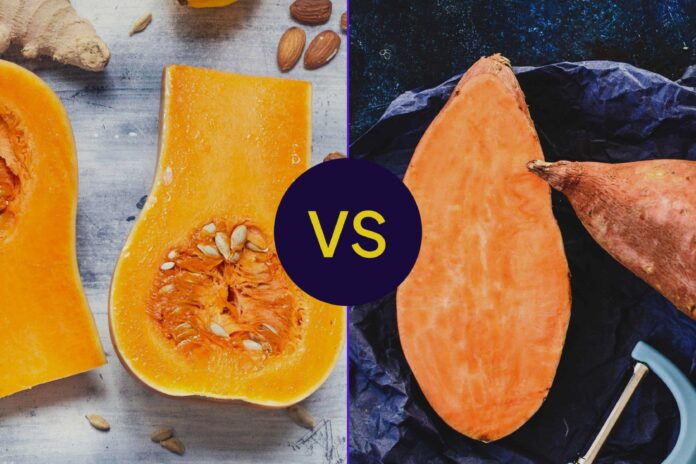Both butternut squash and sweet potatoes are nutrient-rich vegetables offering distinct health benefits. Understanding their differences can help optimize your diet, whether you’re focused on blood sugar control, maximizing vitamin intake, or simply enjoying seasonal flavors.
Key Nutritional Comparisons
Sweet potatoes (1 cup cubed) contain approximately 114 calories, 2 grams of protein, and 26.7 grams of carbohydrates. Butternut squash (1 cup cubed) provides 63 calories, 1.4 grams of protein, and 16.4 grams of carbohydrates. Both are good sources of fiber, potassium, and magnesium.
Shared Benefits: Polyphenols and Minerals
Both vegetables are packed with beneficial polyphenols, plant compounds that protect against cell damage, inflammation, and infections, while also supporting the immune system. The skin of both vegetables contains polyphenols, though some prefer to peel them to avoid potential pesticide residues. Soaking in baking soda and water can help reduce these residues while preserving the skin’s nutrients.
They also provide roughly 10% of the daily value (DV) for potassium and similar amounts of magnesium, both crucial for heart, muscle, and brain health.
Vitamin A: Sweet Potato Takes the Lead
Sweet potatoes are a standout source of vitamin A, with approximately 943 micrograms per cup, covering 104% of the DV. This vitamin supports eye, skin, heart, lung health, and the immune system. Butternut squash provides a still-substantial 745 micrograms (83% DV). Notably, sweet potato leaves are rich in lutein and zeaxanthin, antioxidants that accumulate in the eyes, protecting against light damage.
Blood Sugar and Calorie Control: Butternut Squash’s Edge
Butternut squash offers a lower carbohydrate content (8 grams less per serving) and fewer calories, making it a more suitable choice for those following low-carb diets. It also has a lower glycemic index (GI), meaning it raises blood sugar levels more slowly. Sweet potatoes have a moderate to high GI due to their starch content, which partially converts to sugar when cooked.
Vitamin C and E: Butternut Squash Shines
Butternut squash contains approximately 29 milligrams of vitamin C (32% DV), supporting iron absorption, collagen production, wound healing, and immune function. It also provides 2 milligrams of vitamin E (13% DV), protecting cells from damage caused by pollution, smoking, and UV rays, while supporting healthy blood flow and heart health.
Incorporating Them Into Your Diet
Both vegetables excel in hearty fall meals. Sweet potatoes have a sweet, earthy flavor that caramelizes beautifully when roasted, while butternut squash offers a creamy, nutty, slightly buttery taste.
Consider these options:
– Roast both with herbs and spices for a simple side dish.
– Puree butternut squash into soups or sauces.
– Bake sweet potatoes and top with cinnamon or nutmeg.
Ultimately, both butternut squash and sweet potatoes are valuable additions to a healthy diet. Choosing between them depends on your individual needs and preferences. For those prioritizing blood sugar control and lower calorie intake, butternut squash may be the better option. If maximizing vitamin A intake is your goal, sweet potatoes are a clear winner
